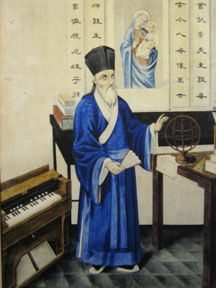 The sainthood cause for Matteo Ricci, SJ, is back on track after a decades-long hiatus during which theologians debated his often controversial reputation. Ricci went to China in 1582 as a missionary. He learned the Chinese language, adopted Chinese customs, and worked to express the Christian faith in concepts and symbols drawn from Chinese culture. He introduced Western science, medicine, and learning to China, and is recognized today as major figure in Chinese history.
The sainthood cause for Matteo Ricci, SJ, is back on track after a decades-long hiatus during which theologians debated his often controversial reputation. Ricci went to China in 1582 as a missionary. He learned the Chinese language, adopted Chinese customs, and worked to express the Christian faith in concepts and symbols drawn from Chinese culture. He introduced Western science, medicine, and learning to China, and is recognized today as major figure in Chinese history.
Many other missionaries have followed Ricci’s lead by expressing Christian doctrine in non-Western cultural terms. Church authorities have decreed that some of these efforts have gone too far–thus, the controversy over Ricci’s legacy. These concerns seem to have dissipated. A bishop involved in the canonization process has said that Pope Francis approved reopening Ricci’s case and specifically commented on Ricci’s “innovative method of evangelization based on the inculturation of the faith.” More on Ricci here.

If I’m not mistaken, the Huron Martyrs also evangelized through cultural adaptation as well. St. Jean de Brebuf, S.J. wrote the Huron Carol in their native language, and I remember learning to sing it for Christmas when I was in school.
Jean,
The Huron Carol is a Best Ignatian Song. Listen to it here.
Ahh…thank you Jim, it’s been a long time since I’ve heard the words in the Native tongue. Though I’m bilingual, English/French, I have forgotten the words of the Huron language. The Huron Martyrs are close to my/my husband’s hearts.
The church used to in ancient times pay more attention to worship than dogma and churchiness. Look for his book at your public library or go to Amazon and read what it’s about — it is actually a lesson in contemplation.
Thanks for the link, looks interesting.
That prolific writer has his own site as well and THAT is interesting: https://cac.org/
I think we all need to read Richard Rohr’s “The Naked Now,” which as a means to explain his theme embraces just that topic of how people worship and how we should go back to the ancient ways.
What ancient ways do you refer to, Linda? I’m interested in hearing about this. In most areas it is almost if not totally impossible to go back to old ways of doing things, but there is the possibility of introducing the old in a modernized format. In any case, I have the sense that we have a treasure trove of riches in the Catholic Church untouched for a long time.
http://www.amazon.com/Naked-Now-Learning-See-Mystics/dp/0824525434